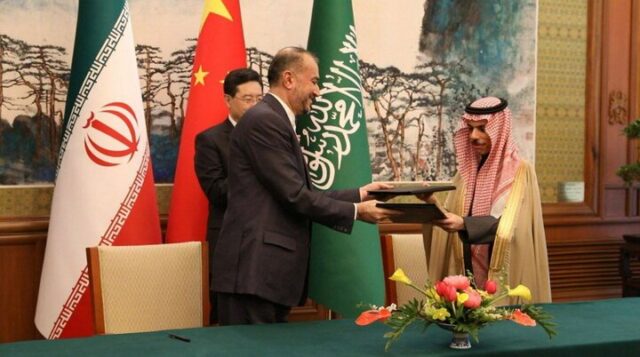From Rivalry to Cooperation: Charting the Future of Iran-Saudi Relations

Persian Files ISSN 2975-0598 Volume 16 Issue 1
Author: Silvia Boltuc
Iran and Saudi Arabia have taken significant steps towards improving their diplomatic relations by appointing respective ambassadors to Tehran and Riyadh. This development marks a historic milestone in the restoration of relations between the two countries.
Abdullah bin Saud Alanazi, the former Saudi ambassador to Oman, arrived in Tehran, while Alireza Enayati, former Iranian ambassador to Kuwait, arrived in Riyadh. Both diplomats emphasised the importance of strengthening cooperation and fostering mutual trust as part of a strategic vision for regional stability.
Iran-Saudi Arabia Relations: A Brief Geopolitical Scenario
On September 5th, 2023, Alireza Enayati, who previously served as the Iranian ambassador to Kuwait, arrived in Riyadh, Saudi Arabia. The Saudi Foreign Affairs Ministry and the embassy staff warmly welcomed the Iranian diplomat granting the beginning of his new diplomatic assignment in the Saudi Kingdom.
Simultaneously, Abdullah bin Saud Alanazi, former Saudi ambassador to Oman, landed in Tehran to assume his new role as Saudi Arabia’s ambassador to Iran. This momentous event symbolizes a historic turning point in the ongoing efforts to rebuild diplomatic relations between the two nations.
Alanazi expressed his commitment to strengthening relations between Saudi Arabia and Iran, both of which share the Persian Gulf as their border region. He emphasised the significance of fostering cooperation and mutual trust in line with a strategic vision that promotes good neighbourliness, understanding, and constructive dialogue between the two countries. Moreover, he stressed that Saudi Arabia’s political outlook for 2030 (Saudi Vision 2030) calls for enhancing cooperation with Iran.
Prior to his departure for Saudi Arabia, Enayati outlined the framework of his mission, which is rooted in the concept of good neighborliness promoted by Iran’s President, Ebrahim Raisi. In an extensive interview with IRNA, the Iranian diplomat recounted the challenging six-month journey of rebuilding bilateral relations, which commenced on March 10th, 2023, thanks to Beijing’s mediation.
He enumerated several key milestones in this endeavor, including the reopening of embassies and consulates, the exchange of diplomatic personnel, the official declaration of relations, visits by foreign ministries to each other’s capitals, and now the exchange of ambassadors.
The restoration of diplomatic ties between Iran and Saudi Arabia was facilitated by a Chinese-brokered deal reached in March 2023. This breakthrough came after a seven-year interruption in relations following protests in Iran against the execution of Sheikh Nimr al-Nimr by Saudi Arabia. One of the significant symbolic gestures in the process of normalization was the official reopening of the Iranian embassy in Saudi Arabia in June, coinciding with the historic visit of Saudi Arabia’s Foreign Minister, Prince Faisal bin Farhan Al Saud, to Iran—his first trip to the country.
The positive trajectory in the diplomatic relationship between Riyadh and Tehran carries the potential to contribute to the stabilisation of the Middle East region. Over the past years, both countries have been involved in conflicts in countries like Yemen, Syria, and Lebanon.
Iranian Foreign Minister Amir-Abdollahian, in his meeting with Hezbollah Secretary General Sayyed Hassan Nasrallah in Beirut, highlighted the constructive nature of recent negotiations with Riyadh. He emphasised that implementing existing agreements would serve as a benchmark for the approaches of both nations in this new chapter of their relationship.
Hezbollah Secretary-General Hassan Nasrallah has accused several times Saudi Arabia of exporting ISIL (ISIS) ideology in Iraq and Syria. In return, in 2016, the GCC designed Hezbollah as a terrorist group. Syria’s return to the Arab League and normalisation between Saudi Arabia and both Iran and Syria, might further serve this new balance in the Middle East.
This cooperation between Iran and Saudi Arabia holds strategic significance in the areas of security, trade, and religious tourism. Additionally, both countries are members of OPEC, and Saudi Arabia, as a major player in the cartel, has witnessed growing values of crude oil exports from Iran.
Conclusion
The appointment of ambassadors to Tehran and Riyadh by Iran and Saudi Arabia signifies a positive trend in the ongoing diplomatic rapprochement between the two nations. This development holds the promise of fostering mutual trust, good neighborliness, and constructive dialogue, in alignment with Saudi Vision 2023 and the Iranian regional policy under President Raisi.
Saudi Vision 2030, aimed at regional stabilisation, has faced challenges in attracting foreign investments due to security concerns in the Middle East and the Gulf region. In contrast, under President Raisi, Iran has pursued a policy of good neighborliness, seeking de-escalation with Eurasian actors and promoting a dense network of trade and exchange. Tehran’s ultimate goal is to alleviate the pressure of sanctions, reduce internal security risks, and emerge from the international isolation imposed by the West.
The normalisation of relations between these key Middle Eastern powers has the potential to contribute significantly to regional stability, affecting areas such as Yemen, Syria, and Lebanon, while also enhancing cooperation in security, trade, and energy.
This new reality will involve also Eurasian key players interested in developing regional trade and transit and transport corridors, as Iran has the geographical potential to become a vital regional hub. As both countries work to overcome their historical differences, their growing relationship will be closely monitored for its impact on the broader geopolitical landscape of the Middle East.
Do you like SpecialEurasia reports and analyses? Has our groundbreaking research empowered you or your team? Now is your chance to be a part of our mission! Join us in advancing independent reporting and unlocking the secrets of Eurasia’s complex geopolitical landscape. Whether through a one-time contribution or a monthly/yearly donation, your support will fuel our relentless pursuit of knowledge and understanding. Together, let’s pave the way for a brighter future. DONATE NOW and secure your place in shaping the geopolitical narrative.
